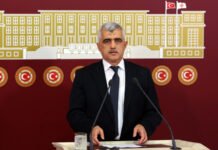Philippe Leclerc, the United Nations High Commissioner for Refugees (UNCHR) representative in Turkey, said approximately 800 Syrians leave Turkey for Syria every week but that conditions are not suitable for a large number of returns.
Turkish President Recep Tayyip Erdogan announced in early May that his government was working on a new project to ensure the “voluntary” return home of 1 million Syrian refugees in Turkey.
According to Erdoğan, Turkey will work in coordination with local parliaments in Syria in 13 regions such as Azaz, Jarabulus and Tell Abyad and that construction of various infrastructure facilities will be part of the project.
Erdogan’s plans did not attract international support, and speaking to Reuters Leclerc said most Syrians would stay in Turkey because the economic conditions were more favorable there than in Syria. “The political, social and economic situation in Syria is deteriorating,” Leclerc added. “Naturally many Syrians want to stay in Turkey because it is a more stable country.”
Turkey hosts the world’s largest number of refugees, 3.7 million from Syria granted temporary protection status, and over 400,000 refugees and migrants from Afghanistan, Iraq and other countries.
Amid increasing public discontent with the rising number of migrants, Erdoğan assured that 12 Turkish NGOs were building houses in Syria’s Idlib province.
Following Erdoğan’s comments, his election ally, far-right Nationalist Movement Party (MHP) leader Devlet Bahçeli, said uncontrolled migration is like an occupation and should be prevented.
Erdoğan and Bahçeli’s remarks about the return of Syrian refugees to Syria come at a time when public surveys show their parties losing significant support amid a financial crisis in the country.
According to the latest survey conducted in 2020 by the UNHCR, 78 percent of Syrian migrants said under no circumstance did they want to return to their country.














